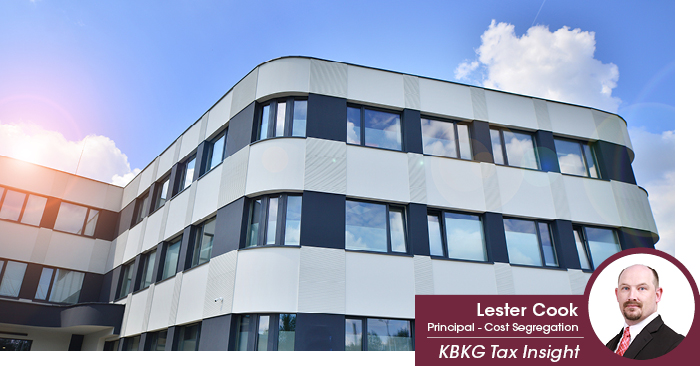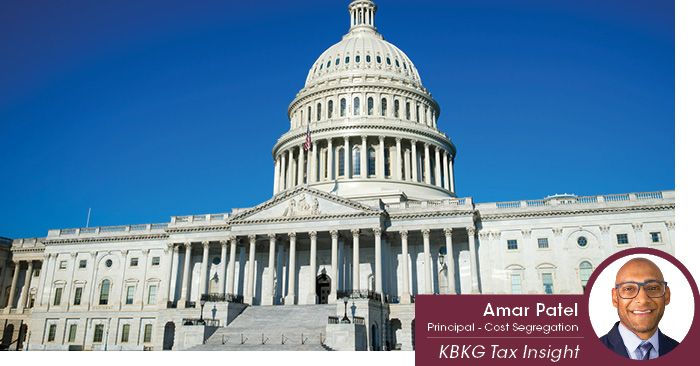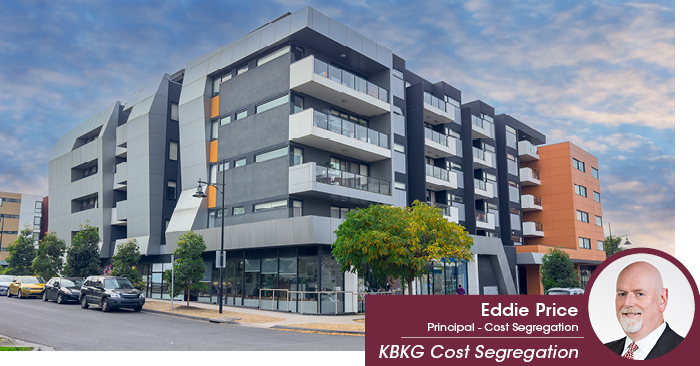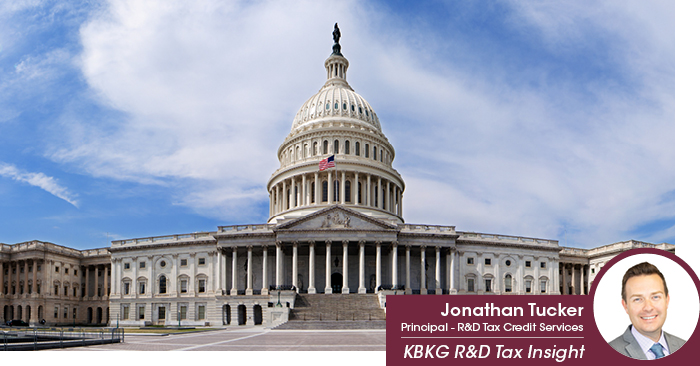


TEAM ON PINK
RIBBON DAY
Cost Segregation Services in Chicago, Illinois
Looking for a cost segregation provider in Chicago? KBKG's local experts can help.
Cost Segregation is a strategic tax savings tool that allows companies and individuals based in Chicago, who have constructed, purchased, expanded, or remodeled any kind of real estate to increase cash flow by accelerating depreciation deductions and deferring federal and state income taxes. In general, it is easy to identify furniture, fixtures, and equipment (FF&E) that are depreciated over 5 or 7 years for tax purposes. However, a Cost Segregation Study goes far beyond that by dissecting construction costs that are usually depreciated over 27 ½ or 39 years. The primary goal of a Cost Segregation Study is to identify all construction-related costs in Chicago that can be depreciated over 5, 7 and 15 years.
For example, 20% to 50% of the total electrical costs in most buildings can qualify as personal property (depreciated over 5 or 7 years). Reducing tax lives results in accelerated depreciation deductions, a reduced tax liability, and increased cash flow.
CHICAGO COST SEGREGATION CASE STUDY:
Walker Properties constructed a brand new office building in Chicago.
The new building has 60,000 square feet and a lot size of 220,000 square feet.
Results: Year one deductions of over $400,000.
Year one increased cash flow of $170,000.
WHAT IS INVOLVED IN A COST SEGREGATION STUDY IN CHICAGO?
A quality Cost Segregation Study evaluates all information including available records, inspections, and interviews, and presents the findings in a clear, well-documented format.
Our process for conducting a detailed Cost Segregation in Chicago includes: A review of all cost detail for the property including but not limited to: the general contractor's application for payment, construction invoices, change orders, depreciation schedules, and appraisals.
COST SEGREGATION FAQs
What should I consider when selecting a cost segregation provider in Chicago?
You should always read the bio and resume of the persons signing your cost segregation study. Make sure they are certified with the American Society of Cost Segregation Professionals (ASCSP). The designation for certified cost segregation professional is CCSP and comes after the engineer's name. Any designation less than that is substandard. Just like you would only use a CPA to file your tax return, you should only use a CCSP to conduct your cost segregation study.
Is KBKG available if I get audited by the IRS?
Any company in Chicago can give you a cost segregation report with results that save you a lot of money; the real question is whether it will stand up to IRS scrutiny. The true value of the fee you pay is how easy (or painful) the audit process goes. Every cost segregation company will say they stand behind their work, but how can you really know what will happen when the IRS audits the report? Using a larger company that has been in business many years should give you comfort that they can successfully defend their work against an IRS audit. Look at their client profile, bigger well known clients have a higher probability of being audited by the IRS. A company without high profile clients probably doesn't have a great deal of experience dealing with the IRS.
Does KBKG have tax experts that can help if my CPA has questions?
There are so many unique fact patterns and situations that can have a tax impact on how the cost segregation deductions will flow through on your tax return. A cost segregation engineer does not know enough about tax to truly understand how the cost segregation deductions will specifically impact you. Using a firm with tax experts on staff will save you money if your CPA has any questions regarding your specific situation. Using a cost segregation firm without tax experts in Chicago means your CPA may have to spend several hours researching the answer and then charge you for that. KBKG has a staff of more than 10 tax experts with over 100 combined years of experience filing tax returns and won't charge you extra to provide answers we have already researched.
How long will it take to complete the Cost Segregation study?
A cost segregation study in Chicago will typically take 30-60 days to complete depending on how quickly we receive the information we need.
How much will a cost segregation study cost in Chicago?
The fee for a cost segregation study in Chicago will range depending on the building size, building type, number of tenants, and other physical characteristics. Typically fees can range from $5,000 to $15,000.
What are the Benefits of Cost Segregation?
Many business owners are surprised to learn of the compelling tax savings a cost segregation study offers. Below is a list of three of the most prominent benefits.
Cash Flow
Generates immediate increase in cash flow through accelerated depreciation tax deductions
Write Off
Quantifies property’s major components and leasehold improvements so they can be written off when replaced or renovated
Review
Provides an independent third-party analysis that will withstand IRS review.
Cost Segregation Tax Insights

Real Estate Incentives Revitalized: What the OBBBA Means for Developers, Investors, and Owners
07/17/2025Follow KBKG on Social Media Linkedin Facebook X-twitter Youtube By Lester Cook | Principal, Cost Segregation The One Big Beautiful Bill Act (OBBBA), signed into law on July 4, 2025, permanently restores and enhances key provisions of the Tax Cuts and Jobs Act of 2017. From 100% bonus depreciation and qualified production property expensing to Opportunity … Read More

OBBB Tax Bill Makes 100% Bonus Depreciation Permanent – What You Need to Know
07/09/2025Follow KBKG on Social Media Linkedin Facebook X-twitter Youtube By Amar Patel | Principal, Cost Segregation Real estate investors know that tax strategies can make all the difference in maximizing profits. One of the most powerful, yet underutilized, tools available is the short-term rental (STR) loophole. This allows real estate investors to utilize property-related rental losses … Read More

Why You Should Only Use a Certified Cost Segregation Professional
06/09/2025Follow KBKG on Social Media Linkedin Facebook X-twitter Youtube When Cost Segregation studies are conducted, professional standards and technical accuracy are critically important, especially as studies are subject to IRS scrutiny. The best way to assess a provider’s qualifications is to confirm whether the person conducting your study is a Certified Cost Segregation Professional (CCSP) … Read More

Form 3115 for CPA’s: Unlocking Missed Tax Deductions Without Amending Returns
06/04/2025Follow KBKG on Social Media Linkedin Facebook X-twitter Youtube Many CPAs likely come across clients who have historically mis- or over-capitalized expenditures, particularly in real estate, retail or manufacturing. Fortunately, tax preparers don’t need to amend years of returns to correct these issues. The IRS offers a fix for this with Form 3115 (Application for … Read More

Navigating the Updated IRS Cost Segregation Audit Techniques Guide: What’s New?
05/30/2025Follow KBKG on Social Media Linkedin Facebook X-twitter Youtube By Amar Patel | Principal, Cost Segregation Cost Segregation remains one of the most powerful tax strategies for real estate investors, allowing them to accelerate depreciation and maximize deductions. On February 6, 2025, the IRS published the latest edition of the Cost Segregation Audit Techniques Guide (ATG), … Read More

How The Short-Term Rental Loophole & Cost Segregation Can Benefit Passive Investors
05/21/2025Follow KBKG on Social Media Linkedin Facebook X-twitter Youtube By Amar Patel | Principal, Cost Segregation Real estate investors know that tax strategies can make all the difference in maximizing profits. One of the most powerful, yet underutilized, tools available is the short-term rental (STR) loophole. This allows real estate investors to utilize property-related rental losses … Read More

The Interplay Between Cost Segregation and a 1031 Exchange
04/22/2025When a property is acquired in a Section 1031 like-kind exchange, tax preparers should consider several facts before deciding how to best depreciate the carryover basis from a relinquished property. When a cost segregation study is also considered on the newly acquired property, additional analysis is recommended before finalizing the 1031 tax basis calculations. To … Read More

100% Bonus Depreciation Making a Comeback?
03/17/2025By Amar Patel | Principal, Cost Segregation In a speech to a joint session of Congress, President Trump outlined priority tax legislation expected later this year to restore provisions of the Tax Cuts and Jobs Act (“TCJA”), which includes “providing 100% expensing, retroactive to January 20, 2025”. This leads many to believe that 100% Bonus Depreciation … Read More

Six Ways Cost Segregation Remains Valuable as Bonus Depreciation Declines
11/12/2024Thought leadership provided by Eddie Price | Principal – Cost Segregation For a long time, the concept of cost segregation has been a powerful tax-saving strategy for real estate investors, enabling property owners to significantly increase their cash flow by accelerating depreciation on certain assets. With the phasing down of bonus depreciation — from 100% … Read More

Senate Votes on Tax Relief Bill for IRC 174 R&E Expenditures, Bonus Depreciation and Section 163(j)
08/01/2024By Jonathan Tucker | Principal, Research & Development Tax Credits In a significant move after months of waiting, the Senate voted on the highly anticipated tax relief for American Families and Workers Act, aimed at easing the financial burden on millions of Americans. Championed by Senate Majority Leader Chuck Schumer to bring a vote in … Read More

